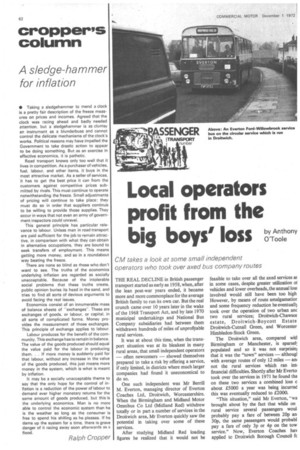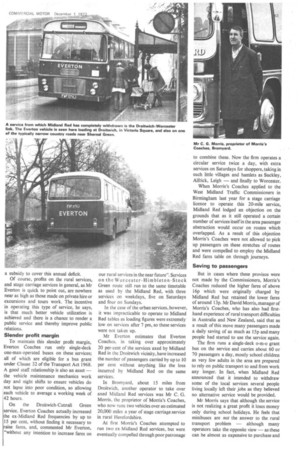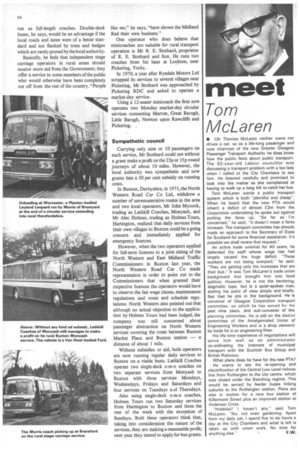Local operators profit from the
Page 64

Page 65

Page 66

If you've noticed an error in this article please click here to report it so we can fix it.
by Antho big boys' loss 0,00,e ny CM takes a look at some small independent operators who took over axed bus company routes
THE REAL DECLINE in British passenger transport started as early as 1958, when, after the lean post-war years ended, it became more and more commonplace for the average British family to run its own car. But the real crunch came over 10 years later in the wake of the 1968 Transport Act, and by late 1970 municipal undertakings and National Bus Company subsidiaries had between them withdrawn hundreds of miles of unprofitable rural services.
It was at about this time, when the transport situation was at its bleakest in many rural areas, that small independent operators — often newcomers — showed themselves prepared to take a risk by offering a service, if only limited, in districts where much larger companies had found it uneconomical to do so.
One such independent was Mr Berrill M. Everton, managing director of Everton Coaches Ltd, Droitwich, Worcestershire. When the Birmingham and Midland Motor Omnibus Co Ltd (Midland Red) withdrew totally or in part a number of services in the Droitwich area, Mr Everton quickly saw the potential in taking over some of these services.
After studying Midland Red loading figures he realized that it would not be feasible to take over all the axed services as in some cases, despite greater utilization ol vehicles and lower overheads, the annual lost involved would still have been too high However, by means of route amalgamatior and some frequency reduction he eventuall) took over the operation of two urban anc two rural services; Droitwich-Chawsor estate, Droitwich-Boycott Estate Droitwich-Cutnall Green, and Worcester Himbledon-Stock Green.
The Droitwich area, compared witl Birmingham or Manchester, is sparsel; populated and so it was not surprisini that it was the "town" services — althougl with average routes of only 12 miles — an' not the rural services which ran inti financial difficulties. Shortly after Mr Everto: took over the services in 1971 he found tha on these two services a combined loss a about E5000 a year was being incurred this was eventually reduced to £2000.
"This situation," said Mr Everton, "wa brought about by the fact that while on rural service several passengers woul probably pay a fare of between 20p an 30p, the same passengers would probabl pay a fare of only 3p or 4p on the tow service." Now, Everton Coaches hat applied to Droitwich Borough Council fc a subsidy to cover this annual deficit.
Of course, profits on the rural services, and stage carriage services in general, as Mr Everton is quick to point out, are nowhere near as high as those made on private hire or excursions and tours work. The incentive in operating this type of service, he says, is that much better vehicle utilization is achieved and there is a chance to render a public service and thereby improve public relations.
Slender profit margin To maintain this slender profit margin, Everton Coaches run only single-deck one-man-operated buses on these services; all of which are eligible for a bus grant under Clause 32 of the Transport Act 1968. A good staff relationship is also an asset — the vehicle maintenance mechanics work day and night shifts to ensure vehicles do not lapse into poor condition, so allowing each vehicle to average a working week of 42 hours.
On the Droitwich-Cutnall Green service. Everton Coaches actually increased the ex-Midland Red frequencies by up to 15 per cent, without finding it necessary to raise fares, and, commented Mr Everton, "without any intention to increase fares on our rural services in the near future". Services on the Worcester-Himbleton-Stock Green route still run to the same timetable as used by the Midland Red, with three services on weekdays, five on Saturdays and four on Sundays.
In the case of the urban services, however, it was impracticable to operate to Midland Red tables as loading figures were extremely low on services after 7 pm, so these services were not taken up.
Mr Everton estimates that Everton Coaches, in taking over approximately 20 per-cent of the services axed by Midland Red in the Droitwich vicinity, have increased the number of passengers carried by up to 10 per cent without anything like the loss incurred by Midland Red on the same services.
In Bromyard, about 15 miles from Droitwich, another operator to take over axed Midland Red services was Mr C. G. Morris, the proprietor of Morris's Coaches, who now runs two vehicles over an estimated 20,000 miles a year of stage carriage service in rural Herefordshire.
At first Morris's Coaches attempted to run two ex Midland Red services, but were eventually compelled through poor patronage to combine these. Now the firm operates a circular service twice a day, with extra services on Saturdays for shoppers, taking in such little villages and hamlets as Suckley, Alfrick, Leigh — and finally to Worcester.
When Morris's Coaches applied to the West Midland Traffic Commissioners in Birmingham last year for a stage carriage licence to operate this 20-mile service, Midland Red lodged an objection on the grounds that as it still operated a certain number of services itself in the area passenger abstraction would occur on routes which overlapped. As a result of this objection Morris's Coaches were not allowed to pick up passengers on these stretches of routes and were compelled to employ the Midland Red fares table on through journeys.
Saving to passengers But in cases where these provisos were not made by the Commissioners, Morris's Coaches reduced the higher fares of above 16p which were originally charged by Midland Red but retained the lower fares of around 13p. Mr David Morris, manager of Morris's Coaches, who has also had firsthand experience of rural transport difficulties in Australia and New Zealand, said that as a result of this move many passengers made a daily saving of as much as 15p and many people had started to use the service again.
The firm runs a single-deck 0-m-u grant bus on the service and carries about 60 or 70 passengers a day, mostly school children as very few adults in the area are prepared to rely on public transport to and from work any longer. In fact, when Midland Red announced that it intended to withdraw some of the local services several people living locally left their jobs as they believed no alternative service would be provided.
Mr Morris says that although the service is not realizing a great profit it loses money only during school holidays. He feels that minibuses are not the answer to the rural transport problem — although many operators take the opposite view — as these can be almost as expensive to purchase and run as full-length coaches. Double-deck buses, he says, would be an advantage if the local roads and lanes were of a better standard and not flanked by trees and hedges which are rarely pruned by th e local authority.
Basically, he feels that independent stage carriage operators in rural areas should receive more aid from the Government; they offer a service to some members of the public who would otherwise have been completely cut off from the rest of the country. "People like me," he says, "have shown the Midland Red their own business."
One operator who does believe that minicoaches are suitable for rural transport operation is Mr R. E. Stothard, proprietor of R. E. Stothard and Son. He runs two coaches from his base at Lockton, near Pickering, Yorks.
In 1970, a year after Ryedale Motors Ltd scrapped its services to several villages near Pickering, Mr Stothard was approached by Pickering RDC and asked to operate a market-day service.
Using a 12-seater tninicoach the firm now operates two Monday market-day circular services connecting Marton, Great Barugh, Little Barugh, Newton upon Rawcliffe and Pickering. .
Sympathetic council Carrying only nine or 10 passengers on each service, Mr Stothard could not without a grant make a profit on the 23p or 15p round journeys of about 10 miles. However, the local authority was sympathetic and now grants him a 50 per cent subsidy on running costs.
In Buxton, Derbyshire, in 1971, the North Western Road Car Co Ltd, withdrew a number of unremunerative routes in the area and two local operators, Mr John Mycock, trading as Lathkill Coaches, Monyash, and Mr Alec Holmes, trading as Holmes Tours, Hartington, realized that daily services from their own villages to Buxton could be a going concern and immediately applied for emergency licences.
However, when the two operators applied for full-term licences to a joint sitting of the North Western and East Midland Traffic Commissioners in Buxton last year, the North Western Road Car . Co made representation in order to point out to the Commissioners that when granted their respective licences the operators would have to observe the fair wage clause, maintenance regulations and route and schedule regulations. North Western also pointed out that although no actual objection to the application by Holmes Tours had been lodged, the company was still concerned about passenger abstraction on North Western services covering the route between Buxton Market Place and Buxton station — a distance of about 1 mile.
Without subsidies or aid, both operators are now running regular daily services to Buxton on a viable basis. Lathkill Coaches operate two single-deck o-m-o coaches on two separate services from Monyash to Buxton with three services Mondays, Wednesdays, Fridays and Saturdays and four services on Tuesdays Lid Thursdays.
Also using single-deck o-m-o coaches, Holmes Tours run two Saturday services from Hartington to Buxton and three the rest of the week with the exception of Sundays. Both these operators think that, taking into consideration the nature of the services, they are making a reasonable profit; next year they intend to apply for bus grants.
































































































































